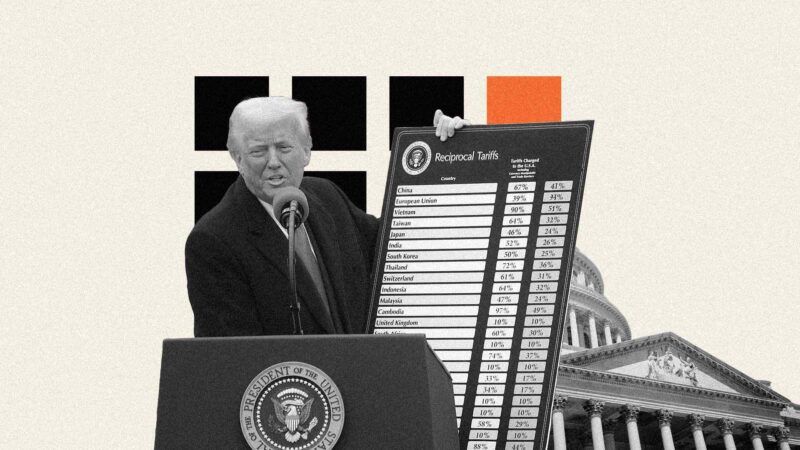The Rationale for the Federal Circuit's 'Radical Left' Tariff Decision Is Fundamentally Conservative
Donald Trump's claim that the appeals court ruled against him for partisan or ideological reasons is hard to take seriously.

After the U.S. Court of Appeals for the Federal Circuit ruled against his tariffs last week, President Donald Trump repeatedly condemned the decision, which he preposterously warned will ruin the country unless it is overturned by the Supreme Court. "It would be a total disaster for the Country," Trump wrote in a Truth Social post on Friday. "If allowed to stand, this Decision would literally destroy the United States of America." He reiterated that claim on Sunday: "Our Country would be completely destroyed, and our military power would be instantly obliterated," he said, adding that "we would become a Third World Nation, with no hope of GREATNESS again."
Trump's prophecies of doom were not the only implausible aspect of his comments. He described the appeals court as "Highly Partisan," implying that its reasoning was driven by political affiliation, and said the majority was "a Radical Left group of judges," implying that the result was dictated by ideology rather than a careful consideration of the facts and the law. Trump reflexively criticizes judges who rule against him in language like this, to the point that he has stripped ideological labels of all meaning. In this case, his complaints are especially hard to take seriously.
The Federal Circuit's tariff decision addressed two lawsuits, one brought by several businesses and one filed by a dozen states. Both sets of plaintiffs argued that Trump exceeded his statutory authority when he relied on the International Emergency Economic Powers Act (IEEPA) to impose stiff taxes on imports from scores of countries.
Seven members of the 11-judge panel agreed. And while it is true that six of those judges were appointed by Democratic presidents (Bill Clinton, Barack Obama, and Joe Biden), the majority also included Alan D. Lourie, who was nominated by George H.W. Bush in 1990. Notably, Lourie was also one of four judges who went further than the majority, arguing that IEEPA "does not authorize the President to impose any tariffs" (emphasis added).
Four judges dissented, saying the plaintiffs "have not justified summary judgment in their favor on either statutory or constitutional grounds." Two of the dissenters were appointed by George W. Bush, and two were appointed by Obama.
These breakdowns do not support Trump's contention that the judges chose sides based on partisan considerations, as opposed to an honest assessment of the statutory and constitutional issues. That explanation looks even less plausible as applied to the May 28 Court of International Trade (CIT) decision that the Federal Circuit reviewed. Three CIT judges, including one nominated by Ronald Reagan and one nominated by Trump himself, unanimously concluded that the president's tariffs were not authorized by IEEPA.
When you consider the reasoning underlying these decisions, the claim that they can be explained only by anti-Trump animus or allegiance to a "Radical Left" ideology looks even sillier. Both courts noted that Trump's use of IEEPA, which does not mention tariffs at all, was unprecedented and involved an assertion of authority that implicated the "major questions" doctrine, which aims to uphold the separation of powers.
According to the Supreme Court, that doctrine applies when the executive branch asserts powers of vast "economic and political significance." In such cases, "the Government must point to 'clear congressional authorization' for that asserted power," the Federal Circuit noted. "The tariffs at issue in this case implicate the concerns animating the major questions doctrine as they are both 'unheralded' and 'transformative.'" The Supreme Court "has explained that where the Government has 'never previously claimed powers of this magnitude,' the major questions doctrine may be implicated."
Trump claimed to have discovered a heretofore unnoticed delegation of unlimited tariff authority in a statute that is nearly half a century old. That claim, the Federal Circuit concluded, "runs afoul of the major questions doctrine."
Far from the invention of "Radical Left" judges, the major questions doctrine stems from a series of Supreme Court decisions spearheaded by conservative justices. The late Antonin Scalia, whom Trump has described as the very model of a "great" jurist, explained the rationale for the doctrine this way in the 2001 case Whitman v. American Trucking Associations: "Congress, we have held, does not alter the fundamental details of a regulatory scheme in vague terms or ancillary provisions—it does not, one might say, hide elephants in mouseholes."
The Supreme Court has applied that logic in several decisions rejecting assertions of agency authority, including the Food and Drug Administration's attempt to regulate tobacco products without explicit congressional authorization, the national eviction moratorium imposed by the Centers for Disease Control and Prevention in response to the COVID-19 pandemic, the COVID-19 vaccine mandate that the Occupational Safety and Health Administration tried to impose on employers in 2021, and the Biden administration's student debt relief plan. Whatever you might think of those decisions, they are hardly evidence of a "Radical Left" mindset.
As in those cases, the central question in the tariff case was whether Congress had actually delegated the broad powers claimed by the executive branch. Another issue was whether Congress could, consistent with the Constitution's separation of powers, delegate such authority. In addition to concluding that IEEPA did not authorize Trump's tariffs, the Federal Circuit noted that "the Government's understanding of the scope of authority granted by IEEPA would render it an unconstitutional delegation."
The rationale for that ruling is not, by any stretch of the imagination, the product of "Radical Left" thinking. It is conservative in the best sense, aiming to preserve the structure of government established by the Constitution.


Show Comments (41)